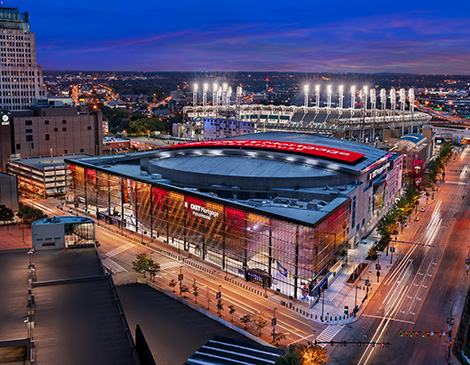Rocket Arena Information

Located in downtown Cleveland, Ohio, Rocket Arena opened in October 1994 as part of the Gateway Sports and Entertainment Complex, known originally as the Gund Arena, after former Cavaliers owner Gordon Gund. Originally the site of the Central Market, a fruit and vegetable market that dated back to 1856, work began in 1992 to build a replacement for the dilapidated Cleveland Arena.
The arena was unveiled with a concert by Billy Joel on October 17, 1994, and the Cavaliers played their first regular-season game in the arena a few weeks later.
Rocket Arena stands as Cleveland’s premier entertainment powerhouse, hosting nearly two million guests annually across more than 175 diverse events. Located at 1 Center Court in downtown Cleveland’s Gateway District, this architectural landmark forms the centerpiece of the Gateway Sports and Entertainment Complex alongside Progressive Field. The multi-purpose arena serves as home to the NBA’s Cleveland Cavaliers and AHL’s Cleveland Monsters, while welcoming the world’s biggest touring acts and premier sporting events.
Capacity and Seating Overview
The facility’s impressive capacity accommodates 19,432 guests for basketball games and 18,926 for hockey matches, making it one of the Midwest’s largest entertainment venues. You’ll discover seating divided across three distinct levels, each offering unique advantages depending on your preferences and budget. The lower bowl brings you closest to the action, club seats provide premium comfort and amenities, while upper-level seating delivers excellent sightlines at accessible price points.
Recent Renovations and Premium Seating
The arena underwent a transformative $185 million renovation completed in September 2019, modernizing every aspect of the guest experience while preserving the building’s iconic presence on Cleveland’s skyline. Beyond standard seating, you can explore luxury suites that circle the venue’s perimeter. These private boxes combine upscale catering options with personalized service and premium furnishings.
Five platinum suites positioned at event level put you as close to performers and athletes as possible while maintaining exclusive amenities. The club seats scattered throughout the mid-level provide cushioned comfort with wider dimensions than standard arena seating, plus access to premium concourses featuring upscale concession stands and private bars.
Sensory Inclusive Certification and Accessibility
Rocket Arena earned distinction as the first NBA venue certified “sensory inclusive” by KultureCity in March 2017. This groundbreaking initiative demonstrates the venue’s commitment to accessibility beyond basic ADA compliance. You can request free sensory bags containing noise-canceling headphones, fidget tools, and weighted lap pads at any guest services location.
The arena features a dedicated quiet room where you or family members can retreat if overwhelmed by crowd stimulation. Staff members receive specialized training to recognize and assist guests with autism spectrum disorders, sensory processing challenges, or similar conditions.
State-of-the-Art Technology and Scoreboards
The facility’s technical capabilities set it apart from comparable venues nationwide. You’ll immediately notice “Humongotron,” the massive scoreboard installed in October 2014 by ANC Sports Enterprises. This centerpiece ranks as the NBA’s fourth-largest scoreboard, delivering crystal-clear video quality visible from every seat in the house.
State-of-the-art sound systems installed during the 2019 renovation provide pristine acoustics throughout the venue. Whether you’re experiencing a rock concert, hip-hop, country, or classical performances, you’ll hear every note with exceptional clarity.
Video Systems and Merchandise
Video systems extend beyond the central scoreboard to include displays throughout the main concourses. You’ll stay connected to the action even when grabbing refreshments or visiting restrooms.
The lower concourse houses the venue’s comprehensive ticket office and a two-level team shop where you can purchase official Cleveland Cavaliers and Cleveland Monsters merchandise, plus event-specific memorabilia for concerts and special events.
The Iconic LED Display
The arena’s roof features a massive LED message board measuring 360 by 90 feet, creating an iconic landmark visible throughout downtown Cleveland. The Cleveland City Planning Commission approved this installation in March 2016, and this enormous display has become a defining element of Cleveland’s downtown skyline. It’s particularly stunning when illuminated during evening events.
Concourse Design Features
Two main concourses provide intuitive navigation throughout the Rocket Arena:
- The ground-level concourse encircles the lower seating bowl, providing access to 100-level seats and 32 lower-level suites integrated into the seating bowl. This walkway also connects to the Gateway East Garage a select other parking points via a climate-controlled bridge at garage level three, meaning you can walk from your vehicle to your seat without ever stepping outside.
- The upper concourse serves 200-level seating while offering bird’s-eye views of the venue’s interior architecture. The renovation significantly expanded both concourses, reducing congestion and improving crowd flow during intermissions and pre-event rushes.
With direct parking garage access, comprehensive accessibility services, and accessibility to dozens of restaurants and hotels, Rocket Arena delivers the complete entertainment experience that keeps fans returning year after year.
The History of Rocket Arena in Cleveland, Ohio
The history of Rocket Arena in Cleveland, Ohio, tells the story of a city’s determination to revitalize its downtown core through strategic infrastructure investment. Understanding this evolution helps you appreciate the venue’s significance beyond just entertainment value, recognizing its role in Cleveland’s broader economic and cultural renaissance.
Cleveland’s Arena Heritage
Before Rocket Arena’s construction, Cleveland’s primary indoor venue was Cleveland Arena, built in 1937 with a basketball capacity of approximately 12,000. The building gained eternal significance as the site of the Moondog Coronation Ball on March 21, 1952, widely recognized as the first rock and roll concert. The Cleveland Cavaliers began their NBA existence at this arena when the franchise was established in 1970.
The Richfield Coliseum Era
The Richfield Coliseum replaced Cleveland Arena as the region’s premier indoor venue when it opened in 1974. Located in Richfield Township between Cleveland and Akron, this 20,273-seat arena brought modern amenities to sports and entertainment. Despite its modern design and generous capacity, Richfield Coliseum created significant challenges due to its suburban location.
Gateway Complex Planning and Development
During the 1980s, Cleveland’s civic and business leaders developed ambitious plans for downtown sports facilities. The breakthrough came in 1990 when Cuyahoga County voters approved a “sin tax” on alcohol and tobacco products. This funding mechanism generated revenue dedicated to constructing and maintaining new sports facilities.
Construction and the Grand Opening
Groundbreaking for the Gateway Complex occurred in 1992, launching one of Cleveland’s most ambitious construction projects. Billy Joel christened Rocket Arena with the venue’s opening concert on October 17, 1994, delivering a sold-out performance that showcased the facility’s world-class acoustics. The Cleveland Cavaliers played their first regular-season game in their new home on November 8, 1994, marking the team’s triumphant return to downtown Cleveland after two decades in suburban Richfield.
The facility opened as Gund Arena, named for the then-Cavaliers owner Gordon Gund, who had purchased the naming rights. This inaugural season represented a new chapter for Cleveland basketball, reconnecting the franchise with the city’s urban core and energizing the revitalized Gateway District.
Evolution Through Ownership Changes
Dan Gilbert’s March 2005 purchase of the Cleveland Cavaliers marked a new era for the franchise and the venue. In August 2005, Gilbert purchased the arena’s naming rights and renamed it Quicken Loans Arena after his mortgage lending company, signaling his commitment to Cleveland basketball.
The building became affectionately known as “The Q” among fans and local media throughout this period. It was renamed to Rocket Mortgage FieldHouse in April 2019 following the company’s corporate rebranding, coinciding with the completion of the massive $185 million renovation project.
Most recently, the venue became Rocket Arena in 2025 when Rocket Mortgage simplified its corporate identity to simply be “Rocket.” Each name change has reflected the evolution of the Gilbert family’s business empire and the arena’s continuous improvements over three decades.
